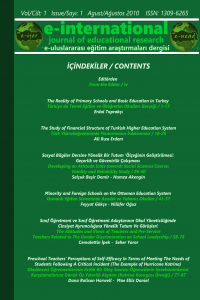The Perceptions of Students Studying at a Vocational School on the Role of English in Their Lives and Their Reasons to Learn English / Meslek Yüksekokulu’nda Okuyan Öğrencilerin İngilizcenin Hayatlarındaki Rolü ile ilgili Görüşleri ve İngilizce Öğrenme Sebepleri
Türkiye’de uzun yıllardır İngilizce yabancı dil olarak öğrenilmekte ve öğretilmektedir. İngilizce’nin öğrencilerin yaşamı üzerine rolü pek çok çalışmaya konu olmasına rağmen, şu ana kadar meslek yüksekokullarında okuyan öğrencilerin görüşleri araştırılmamıştır. Bu yüzden bu çalışmanın amacı meslek yüksekokulunda okuyan öğrencilerin İngilizce’nin mesleki ve sosyal yaşamlarını nasıl etkilediğine dair görüşlerini ortaya koymaktır. Çalışmanın amacı göz önünde bulundurularak nitel bir çalışma metodu uygulandı. Turizm ve Otel İşletmeciliği ve Muhasebe ve Vergi Uygulamalarında okuyan 10 gönüllü öğrenci yarı yapılandırılmış görüşmeye katıldı. Görüşmelerden elde edilen veriler tematik analiz kullanılarak analiz edildi. Sonuçlar, öğrencilerin İngilizce öğrenmeye karşı algıları ve İngilizce öğrenme sebepleri olmak üzere iki tema ortaya çıkardı. İlk tema, olumlu ve olumsuz davranışlardan oluşmaktadır ve diğer temanın ise “meslek, iletişim ve eğlence” olmak üzere üç kodu vardır.
Anahtar Kelimeler:
İngilizce öğretimi, İngilizce öğrenme, Meslek Yüksekokulu, Yabancı dil
The Perceptions of Students Studying at a Vocational School on the Role of English in Their Lives and Their Reasons to Learn English / Meslek Yüksekokulu’nda Okuyan Öğrencilerin İngilizcenin Hayatlarındaki Rolü ile ilgili Görüşleri ve İngilizce Öğrenme Sebepleri
English as a foreign language has been learnt and taught in Turkey for many years. Although the role of English in students’ lives is the subject of a number of studies, there is little research on the perceptions of students studying at vocational schools. Therefore, the purpose of this study is to explore the perceptions of students studying at a vocational school about how English affects their professional and their social life. Considering the purpose of the study qualitative research method was applied. Ten volunteer students studying Tourism and Hotel Management and Accounting and Tax Application participated in the semi-structured interview. Data gathered from interviews were analyzed using thematic analysis. The results revealed two themes which were the perceptions of students towards learning English and their reasons to learn English. The first theme consists of positive attitudes and negative attitudes and the other theme has three codes which are as follows: profession, communication and entertainment.
Keywords:
English teaching, English learning, vocational school, Foreign language,
___
- Bani-Khalad, T.A.A. (2014). The role of English as perceived by students of applied English at the university of Jordan. European Scientific Journal, 10 (5), 400-420.
- Bialystok, E.,& Hakuta, K. (1994). In other words: The science and psychology of second-language acquisition. New York: Basic Books.
- British Council (2013). The English effect. Retrieved from https://www.britishcouncil. org/sites/default/ files/english-effect-report-v2.pdf.
- Creswell, J.W. (2012). Educational research: Planning, conducting, and evaluating quantitative and qualitative research (4th edition). Boston: Pearson Education
- Dogancay-Aktuna, S. (1998). The spread of English in urkey and its current sociolinguistic profile. Journal of Multilingual and Multicultural Development, 19(1), 24-31.
- Doms, D. (2003).Roles and impact of English as a global language.MA TEFL/TESL(ODL). University of Birmingham, Birmingham.
- Erdel, D.,& Akalın,S. (2015). Evaluating English language course in a Turkish university. Journal of Educational and Instructional Studies in the World, 5(4), 26-35.
- Eurumonitor International (2010). The benefits of the English language for individuals and societies: Quantitative indicators from Cameroon, Nigeria, Bangladesh and Pakistan. A custom report compiled by Euromonitor –International for the British Council.
- Genesee, F.,& Cloud, N. (1998). Multilingualism is basic. Educational Leadership, 55(6), 62-65.
- Gömleksiz, M.N. (2010). An evaluation of students’ attitudes toward English language learning in terms of several variables. Procedia-Social and Behavioral Sciences, 9, 913-918.
- Hann, N., Timmis, I., Alkhaldi,A.A., Davies, B., Troncoso, C.R., & Yi,Y. (2014). The impact of English on learners’ wider lives. British Council. Retrieved from https://www.teachingenglish.org.uk/sites/teacheng/files/E085%20Impact%20of%20English%20on%20learners'_A4_web_FINAL.pdf.
- Jeffery, L. (2008). Early language learning research. White Paper Report.
- Johnson, K.(2013). An introduction to foreign language learning and teaching. New York: Routledge.
- Karahan, F. (2007). Language attitudes of Turkish students towards the English language and its use in Turkish context. University of Çankaya Faculty of Science and Literature Journal of Arts and Sciences, 7, 73-87.
- Oroujlou, N., & Vahedi, M. (2011).Motivation, attitude, and language learning. Procedia-Social and Behavioral Sciences, 29, 994-1000.
- Önder-Özdemir, N. (2014). The role of English as a lingua franca in academia: The case of Turkish postgraduate students in an Anglophone-centre context. Procedia-Social and Behavioral Sciences, 141, 74-78.
- Özen, E.F., Alpaslan,İ.B., Çağlı, A., Özdoğan,İ., Sancak,M., Dizman,A.O., & Sökmen, A. (2013). Turkey national needs assessment of state school English language teaching. Retrieved from http:// www.britishcouncil.org.tr/sites/default/files/turkey_national_needs_assessment_of_state_school_english_language_teaching.pdf
- Öztürk, Z. (2015). Opinions of university preparatory school students towards the effects of learning English on their career. Procedia-Social and Behavioral Sciences, 199, 785-792.
- Sarıçoban, G. (2012). Foreign language education policies in Turkey. Procedia-Social and Behavioral Sciences, 46, 2643-2648.
- Singhal, M. (1997). The internet and foreign language education: Benefits and challenges. The Internet TESL Journal, 3:6. Retrieved from http://iteslj.org/Articles/Singhal-Internet.html.
- Stewart, J.H. (2005). Foreign language study in elementary schools: Benefits and implications for achievement in reading and math. Early Childhood Education Journal, 33(1), 11-16.
- Tardy, C. (2004). The role of English in scientific communication: lingua franca or Tyrannosaurus rex?. Journal of English for Academic Purposes, 3, 247-269.
- Tomak, B. (2011). The perspectives of both Turkish students and Turkish teachers on English learning/teaching as an international language. 2nd International Conference on ew Trends in Education and Their Implications, 277-285.
- Uztosun, M.S. (2011). A qualitative study into English language teachers’ and students’ beliefs and practices in Turkey. The International Journal of Research in Teacher Education, 2(2), 16-34.
- Weatherford, H.J. (1986). Personal benefits of foreign language study. ERIC Digest. U.S.: District of Columbia. Retrieved from http://www.ericdigests.org/pre-924/study.htm.
- Zaim, C. (2011). Benefits of learning a foreign language. Retrieved from http://www.academia.edu/6580048/AFE_155__Benefits_of_Learning_a_Foreign_Language.
- Yayın Aralığı: Yılda 2 Sayı
- Başlangıç: 2010
- Yayıncı: Erdal TOPRAKCI
Sayıdaki Diğer Makaleler
Yılmaz İlker Yorulmaz, Ahmet Duman
